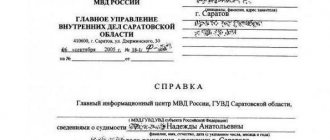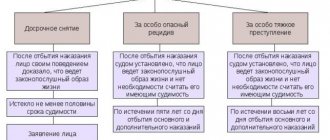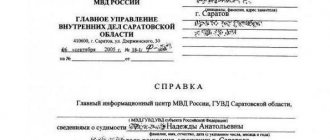Criminal record is the legal status of a citizen who has been found guilty of a crime by a court. From the moment the verdict is announced, a criminal record becomes an integral part of a person. Regardless of how much time has passed, how long a person has served, whether he has been released, whether he has expiated his guilt, the criminal record (information about criminal prosecution) remains with him.
Information about it is stored in the so-called Information Centers at the Internal Affairs Directorate of the region, region, city, country. Only law enforcement agencies have the right to make requests to such centers. Neither banks, nor commercial services, nor any other civil offices can send a request to the Information Center in order to find out additional autobiographical data of an individual. But we live in Russia, now large companies often employ former law enforcement officers who still have “personal connections.” It will not be difficult for them to find out the information they are interested in from such a database.
Such a request cannot be of an official nature, but the data can easily be used in everyday work. The issue is especially acute for citizens of the Russian Federation who have decided to leave for permanent residence in a foreign country and obtain citizenship in another country. In this regard, there are people who would like to remove their data from the database of convicts. A completely understandable desire, but completely impossible to fulfill. No matter what the scammers promise, no matter what connections they use, it is technically impossible to delete criminal records - that’s how the system was created. Even a person who constantly works with such a database cannot delete anything there. Therefore, any promises of this nature are in all cases fraud and a scam of money. Be careful!!!
Do not confuse the exclusion of information about a criminal record with the procedure - expungement of a criminal record after serving a sentence through the court (follow the link for more information about the assistance of our criminal lawyer in this area).
ATTENTION : watch a video about defending the rights of the accused by a lawyer and subscribe to our YouTube channel, you will have access to free legal assistance from a lawyer through comments on the video.
Specifics of expunging and expunging a criminal record
When answering the question of how to expunge a criminal record, it should be mentioned that initially this process takes place automatically at the moment when the period assigned by the court for staying in prison has ended and the person has been released. After this, the citizen is considered not to have been convicted.
The legislation establishes two ways to expunge a criminal record:
- its repayment.
- withdrawal (carried out through the submission of a document such as a petition to withdraw guilt).
The first option is marked by the fact that the consequences imposed by the court through the status of a punished person are automatically annulled. The terms of repayment of penalties are regulated by law and have a clearly defined period.
This is also important to know:
Certificate of no criminal record - how and where to get it in 2019
This process happens automatically:
- At the moment when a certain period established by current legislation passes (the period after which a criminal record is expunged depends on the category of the crime committed).
- A calendar year after the sentence was served outside of prison.
- At the end of the probationary period.
Expungement of a criminal record is a process that marks the early removal of a sentence through the court and deprives a person of certain restrictions and legal frameworks. This method does not happen automatically, but is carried out through a petition to withdraw guilt , which is submitted to the courts. The main material on the basis of which a conclusion will be drawn from the outside is a positive description of the accused.
find_in_page
Articles on the topic
(click to open)
- Information about criminal records and how to remove information about criminal records from the Ministry of Internal Affairs database
- Certificate of no criminal record - how and where to get it in 2019
You might be interested to know how to check a person’s criminal record online (in Russia) and how to remove a criminal record from the database?
Free legal consultation
Free legal consultation We will answer your question in 5 minutes!
Ask a Question
We will answer your question in 5 minutes!
Ask a Question
On what grounds can you try to remove records from the database?
Only under certain circumstances can a citizen try to have his criminal record expunged. We are talking about such moments:
- The mistake was made by officials, and the information was entered into the database by accident. The entry is deleted very quickly under such circumstances.
- An acquittal was rendered against a specific person. This is a valid reason for removing the mark of criminal prosecution.
Important! Cancellation of a suspended sentence also requires removal from the database, since the mark is made there initially and remains for many years.
The statute of limitations in criminal cases can reach 25 years, so such documents are kept for the specified period. With a criminal record, everything is even more serious, since relapses are possible. It is important to add that if someone offers to delete an entry for money, you should not believe it, because this is a fraudulent scheme.
Deadline for expiration of a criminal record
Time periods during which it is possible to prepare documentation for a process such as expunging a criminal record:
- for conditionally convicted persons - the end of the probationary period;
- 1 year - for persons who received more lenient punishments than imprisonment;
- 3 years - if the person has committed a crime that is characterized by the court as not serious;
- 8 years - if the person committed an act determined by the court as a crime of average gravity;
- 10 years - if the court has established a particularly serious type of action committed by the person;
- the end of the sentence is regulated by a court decision (valid for conditional status of punishment).
This is also important to know:
Information about criminal records and how to remove information about criminal records from the Ministry of Internal Affairs database
For prisoners who have not reached the age of majority, the terms of repayment of punishment are shorter.
What information must be included in the application?
To finally understand how to remove a criminal record from the Ministry of Internal Affairs database, it is worth paying attention to drawing up a petition. The document must contain all the important information on the case necessary to make a positive decision.
So, the application must contain the following information:
- information about the applicant and data from the judicial authority;
- reasons for removing a mark from the database;
- request to remove such information;
- legal basis for the position stated by the citizen;
- reasons to make a positive decision;
- list of documentary evidence in the form of attachments;
- date of application and signature of the applicant.
The petition is submitted to the court office, and the citizen must wait until it is considered. After this, all that remains is to enforce the decision (if it is positive) or challenge it in court.
How can a criminal record be expunged before the deadline?
The court can make such a decision. The main material on which the court must rely is a petition to expunge a criminal record , submitted by the previously imprisoned person himself. This procedure is regulated by law, Part 5, Art. 86 of the Criminal Code of the Russian Federation.
Important
Removal of guilt excludes any legal restrictions that could be imposed on the convicted person. For example, restrictions on hiring, as described above.
A petition for early removal of a sentence is drawn up according to the established template. The following are the reasons for its compilation:
- Return of a person from a colony (the temporary repayment period has not yet passed).
- Provided that during his stay in the colony the defendant was noted for positive behavior.
- Has a current positive characteristic at the place of residence or work (if any).
- Does not ignore visiting the UII.
- He independently admits his guilt and wants to correct himself and start a new law-abiding life.
- Complies with all requirements and conditions officially assigned by the court.
Why is it desirable to expunge a criminal record?
A record of a criminal record for a particular person does not allow a person to lead a full life. Usually we are talking about problems with traveling to other countries, difficulties with finding employment. In addition, a criminal record can have a negative impact on a citizen’s immediate family. For this reason, many seek to remove this restriction in order to lead a normal life in the future. This issue is regulated by Article 74 of the Criminal Code of the Russian Federation.
Advice! Even if a citizen moves to another region or city, the criminal record will remain, since the database is common for all regions.
How to fill out a petition to expunge a criminal record
A petition for early expungement of a criminal record has a form established by law.
The sample is also available on government websites, including the UII. A prerequisite is the provision of additional documentation:
- Sentence.
- A certificate indicating the serving of a sentence.
- A request to remove guilt must be confirmed by a written reference from the head of the colony.
- Written evidence of damage caused during the commission of a crime (if any).
This document regulating the expungement of a criminal record must contain the following information:
- All personal information about the convicted person.
- Information about the court where the case is being heard.
- A description of the facts that could be the reason for such a process as the removal of punishment.
- A personally written request (pardon).
- Drawing up and arguing the reasons why this status interferes with leading a normal lifestyle.
- Attach documentation and other written evidence as described above.
Please note that expungement of a criminal record is carried out only if there is evidence and reasons established by law. Therefore, a reference to certain legislative norms will be a favorable and contributing fact.
Take a closer look at the sample petition to the court.
The concept of a criminal record and the significance of its presence for a convicted citizen
This is the legal state of a person, which is determined by the fact of his conviction and sentencing for the crime he committed. If a person who has an outstanding or unexpunged criminal record commits a crime again, more stringent measures of criminal liability are applied to him (Resolution of the Constitutional Court of the Russian Federation dated March 19, 2003 No. 3-P).
A person is considered to have a criminal record from the day a court’s conviction for an illegal act comes into force against him. A person who has been released from punishment is considered to have no criminal record.
This status is removed from a person from the moment his criminal record is cleared or expunged.
Note!
The information remains in the Ministry of Internal Affairs database and is visible in certificates issued by law enforcement agencies.
What are the limitations of people on probation?
How the person will behave after the ruling has been made by the judicial authority determines the future fate of the perpetrator.
It has certain obligations:
- notification of specialized institutions if permanent place of residence, work, study changes
- restrictions on visiting certain places
- do not use drugs and alcohol
- eliminate bad habits
- in case of infection with a sexually transmitted disease, it is mandatory to report to a hospital with subsequent treatment
- at the discretion of the judge, military service is excluded
- voting rights are lost
- need official employment
Terms of conditional conviction
Law enforcement officers, as a separate line in the sentence, make a decision to prohibit leaving the territory of the Russian Federation, with the confiscation of the international passport.
In exceptional circumstances, when a close relative falls ill or it is necessary to go to his funeral, relaxations in harsh conditions are possible.
Submitting an application to the head of the controlling institution with a request to release him will resolve the issue.
The application must be accompanied by papers proving the need for the trip and confirming the relationship with the person on the other side of the border.
Article 29 imposes restrictions on the choice of service; a person, even with an expunged criminal record, does not have the right to work in:
- police agencies
- FSB
- prosecutor's office
Not all enterprise managers treat former convicts with an unbiased attitude, and this is often the reason why they are denied employment, even if the criminal record has long been cleared.
Equipping many organizations with modern technical equipment and checking the data of candidates for work will not be difficult, since they remain in the Ministry of Internal Affairs. Although it is not necessary to indicate about your past in the personal information, a person has the right to do so when he finds out after how many years the suspended conviction is completely removed and he goes through the entire procedure.
Sectoral and general implications
A convicted person acquires certain legal restrictions of a criminal, criminal-executive and general legal nature. This status is taken into account when determining recidivism and, as a result, increasing punishment. It also limits the rights to engage in certain types of activities, acquire citizenship, adoption and others.
As stated earlier, people with a criminal record have certain limitations that create problems in their daily lives. Such negative consequences are called general legal, since they limit the social rights of citizens regulated by civil, family, labor, and administrative legislation.
Social (general legal) restrictions for convicted citizens are that the person:
- has no right to hold the position of judge or prosecutor. The laws regulating this requirement also establish restrictions for those citizens who had a criminal record, but it has now been terminated;
- does not have the right to be a member of the Constitutional Court of the Russian Federation. According to the law, the candidate must have an impeccable reputation, which means no criminal record, including an expunged one;
- cannot serve in the Ministry of Internal Affairs;
- does not have the right to practice law;
- deprived of the right to conduct teaching activities. This ban applies to those citizens who have been convicted and punished for committing a number of crimes. You can find out which criminal act is included in this list and which is not in the Labor Code of the Russian Federation;
- deprived of the right to perform military service while having a criminal record;
- actually does not have the right to change his first and last name while he is convicted;
- cannot work in bodies whose main activity is ensuring security;
- has no right to keep and bear arms;
- cannot be an adoptive parent or guardian;
- cannot obtain entry or exit permission, residence permit or citizenship in some foreign countries while in the status of a convicted person. Until the criminal record is terminated, the border is usually closed for sentenced persons.
Criminal legal consequences arise as a result of the commission of another offense by a convicted citizen and, as a rule, aggravate his guilt.
Industry consequences include the following:
- the presence of repetition or recidivism of criminal acts;
- excluding the possibility of exemption from sentencing due to the existence of legitimate reasons;
- the possibility of exercising the right to parole is practically excluded (how long after it is possible to apply for parole);
- a criminal record influences the choice of correctional institution to which a convicted person is sent (colony regime).
Introduction to the probationary period
Depending on the severity of the offenses, a lenient judgment encourages the perpetrators to follow the intended conditions to justify the trust given.
The sentence can be as short as six months, with a maximum of five years.
All the time, being under the constant surveillance of law enforcement agencies, the convicted person is obliged to prove by his impeccable behavior that he is law-abiding.
If a violation of the regime is discovered or a minor offense is committed while on probation, the suspended sentence may be called into question. Committing a deliberate, serious crime will remove all questions, since they will definitely deprive you of freedom.
Ways to terminate a criminal record
Expungement of a criminal record
There are 3 options for ending a criminal record:
- upon repayment;
- when removed in court;
- as a result of amnesty or pardon of a person.
The main difference between the presented methods is the termination period and procedure. Repayment is carried out automatically upon completion of the time established by the Criminal Code, and withdrawal is carried out earlier than the appointed time on the basis of a court decision or other federal act of government authority.
Early withdrawal occurs on the basis of:
- court decisions;
- amnesty law;
- individual act of the head of state, namely pardon.
When is a criminal record expunged in Russia?
Information about how many years after a criminal record is cleared by expungement is presented in this Criminal Code. The actual repayment period depends on the severity of the crime committed. You can find out the procedure for calculating deadlines in Art. 86 of the Criminal Code, which accordingly provides for repayment periods.
How is the time after which a criminal record is automatically expunged is calculated:
- for those who have been punished. not associated with imprisonment, extinguished after a year;
- three years if the person was sentenced to imprisonment for a term of up to three years, as well as if the period of imprisonment was no more than 5 years;
- eight years when serving a sentence of imprisonment for a term of not more than 10 years. Such punishment is established for intentional serious crimes;
- ten years, if the offender, according to the sentence, was imprisoned for a term of more than 10 years, as well as when more stringent measures were imposed;
- when the probationary period ends if a suspended sentence was imposed.
The calculation of the term begins from the final date of departure or completion by the convicted citizen of the imposed penalty.
How does the procedure for terminating a criminal record go through the court?
Mandatory conditions, the fulfillment of which is taken into account when removing a criminal record before the established time in court:
- impeccable behavior of the convicted person all the time after serving or fulfilling the sentence imposed by the sentence;
- filing a corresponding petition with the court located at the applicant’s place of residence. Here you may need to consult a lawyer if you want the application to comply with procedural rules and be accepted for consideration. You can also write a document using a free online consultation with a lawyer;
- providing evidence of the person’s complete correction and repentance for his actions;
- full compensation for the damage caused.
The applicant may use the following materials as evidence:
- Characteristics from the place of work and from neighbors, containing information about the lifestyle and behavior of the person while he had a criminal record;
- A certificate from law enforcement agencies confirming that there have been no cases of administrative liability for a certain period of time;
- Other documents confirming the moral lifestyle of the convicted person.
Removal of a criminal record based on an act of amnesty or pardon
In addition to a judicial resolution of the issue, expungement of a criminal record is possible through an amnesty.
Amnesty is a legal act of a criminal nature adopted by the State Duma of the Russian Federation, the main purpose of which is the full or partial release of a certain category of persons from serving or fulfilling a sentence, as well as the early expungement of criminal records for those citizens who were convicted and fulfilled the penalty established by the court. . In addition, an act of amnesty can replace a more severe punishment with a more lenient one.
As a rule, the act covers the category of persons defined by the document, and not specific people. Convicted persons who fall into this category are notified of the expungement of their criminal record in connection with amnesty through written correspondence.
A pardon is an individual act of the head of state, the purpose of which is to mitigate or release from the unserved part of the sentence, as well as to remove the criminal record of a specific person.
Although the goals of the documents in question are similar, there are differences between them:
- body adopting the act;
- method for determining the circle of persons covered by the document;
- procedure and grounds for acceptance.
Why can they refuse to withdraw?
Assessing the circumstances of the case and the behavior of the prisoner while serving his sentence, the judge may refuse to remove the criminal record. This is possible in the following cases:
- the offense committed is classified as especially dangerous;
- too little time has passed since the sentence came into force;
- the conduct of the perpetrator was not impeccable;
- the order of serving the sentence was violated (for example, the convict did not appear at the correctional institution for registration);
- After serving his sentence, the former prisoner committed administrative offenses.
If the court refuses to expunge a criminal record, then you can submit a second petition no earlier than a year later.
Legal consequences of a criminal record
Legal consequences of a criminal record
A convicted person acquires certain legal restrictions of a criminal, criminal-executive and general legal nature. This status is taken into account when determining recidivism and, as a result, increasing punishment. It also limits the rights to engage in certain types of activities, acquire citizenship, adoption and others.
For example, an outstanding criminal record does not give a citizen the right to travel outside the country. Also, former convicts are prohibited from holding positions in the court, prosecutor's office, customs and other areas. Read more in the article here
Commentary on Article 86 of the Criminal Code of the Russian Federation:
1. A criminal record is a special legal status of a person, conditioned by the fact of his conviction for committing a crime to any punishment and characterized by certain unfavorable social and criminal legal consequences for him. It completes the implementation of criminal liability in the form associated with the imposition of punishment on a person.
2. The status of a criminal record begins from the day a court conviction comes into force and continues until it is expunged or withdrawn.
3. A criminal record is associated with certain restrictions on rights. The general social significance of a criminal record is that persons with a criminal record cannot perform certain labor functions (hold positions of judges, prosecutors, investigators, etc.). Persons with a conviction for a serious crime are not conscripted for military service, cannot be the adoptive parent of a child, etc. When filling out official forms, a person is required to disclose whether he or she has a criminal record.
The criminal legal consequences of a criminal record occur if a person who has an unexpunged or unexpunged criminal record commits a new crime. They are as follows:
- in the presence of various combinations of convictions for committing intentional crimes, a relapse, dangerous or especially dangerous recidivism is established;
- in a number of cases, a criminal record is provided by the legislator as an element of the main element of the crime (Article 314 of the Criminal Code);
- the presence of a criminal record is recognized as an aggravating circumstance when a person commits a new intentional crime (clause “a”, part 1 of article 63 of the Criminal Code);
- the presence of criminal records and their number affect the conditions for serving a sentence of imprisonment (Article 58 of the Criminal Code), etc.
4. Persons who have committed a crime but are released from punishment are considered unconvicted.
5. The legislation provides two ways to terminate a criminal record:
- 1) repayment;
- 2) withdrawal.
Expungement means the automatic cessation of all legal consequences associated with the fact that a person has been convicted of committing a crime due to the expiration of the deadlines specified in the law. At the same time, to recognize a person as having no criminal record, neither a special court decision nor any other document certifying this fact is required.
The terms for expunging a criminal record vary depending on the type of punishment imposed and the category of the crime committed. The period for expunging a criminal record for persons sentenced to a punishment less than imprisonment is one year. In such cases, the category of the crime committed does not matter. When a person is sentenced to imprisonment, the expiration period for a criminal record depends on the category of the crime committed.
An exception is made only for those sentenced to probation: the criminal record of these convicts is expunged upon expiration of the probationary period (clause “a”, part 3 of Article 86), if the suspended sentence was not canceled on the grounds provided for in Art. 74 of the Criminal Code.
6. In cases where a person is assigned an additional sentence in addition to the main one, the expiration period for a criminal record begins to run from the moment of serving not the main, but the additional punishment. In case of early release from punishment, this period is determined based on the category of the crime committed, and is calculated from the moment of expiration of the actually unserved part of the sentence.
7. If the sentence was not carried out in the absence of evasion by the convicted person from serving the sentence, then with the expiration of the statute of limitations for the execution of the conviction, the person is considered not to have a criminal record.
8. Expungement of a criminal record means the termination of its legal consequences before the expiration of the terms established by the Criminal Code for expungement of a criminal record. If the convicted person behaved impeccably after serving his sentence, then, at his request, the court may early remove his criminal record.
In addition to the judicial procedure for expunging a criminal record, the legislation provides for the possibility of such expungement through an amnesty act or through a pardon.
9. From the moment a criminal record is expunged or removed, a person with a previous conviction is recognized as not having a criminal record, and all legal consequences associated with the fact that this person committed a crime and was convicted for it are finally and unconditionally annulled.
When is a suspended conviction lifted?
Article 86 of the Criminal Code states that the removal of a suspended conviction is possible after half the probation period has expired. In this case, the probationary period can last from six months to 5 years.
During this period, the offender must prove his correction, for example:
- recover from sexually transmitted diseases;
- get a job;
- be registered;
- notify about a change of place of study, etc.
Requirements for removing a suspended conviction:
- impeccable behavior of the convicted person (which must be confirmed by documents, certificates and certificates);
- absence of administrative or disciplinary offenses;
- compensation for damage caused to the victim, payment of fines;
- admission of guilt by the convicted person and fulfillment of all obligations imposed on him by the court.
Expungement of a criminal record completely eliminates the consequences of a conviction . According to the law, it will be considered that the citizen was not prosecuted at all and did not serve a sentence.









